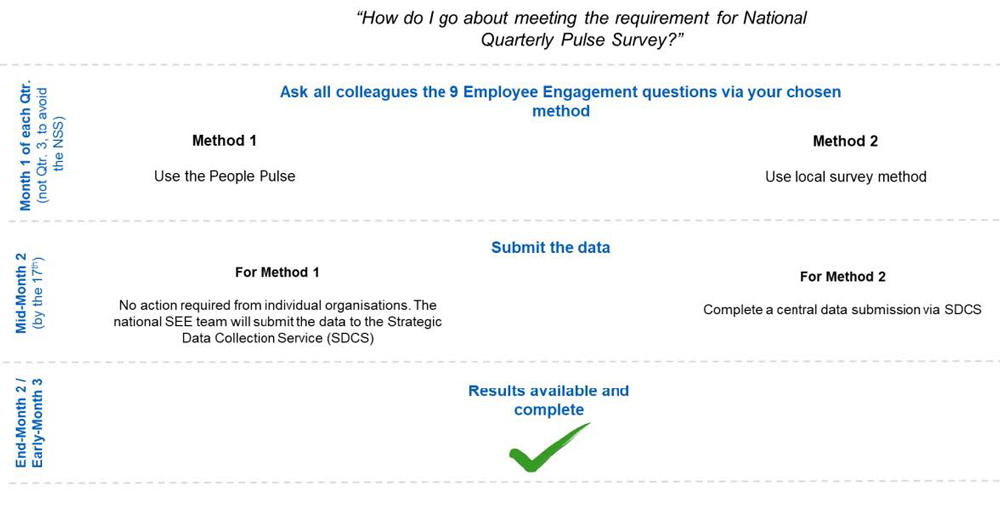The requirement
The People Plan 2020/21 – action for all of us committed to ensuring staff have a voice. This is an integral part of the People Promise: We each have a voice that counts. The People Plan also set out the need to launch a new quarterly survey to track employee engagement on a more regular basis.
The National Quarterly Pulse Survey was implemented initially via the People Pulse in April 2021. Since July 2021, all provider organisations are now required to roll out the survey on a quarterly basis (except Q3, to account for the annual NHS Staff Survey fieldwork period). The NHS Standard Contract was amended in April 2022 to incorporate the NQPS requirement.
The required questions comprise of the nine engagement themed questions from the annual NHS Staff Survey, these questions are focused on three sub-components of employee engagement: motivation, involvement, and advocacy.
- I often/always look forward to going to work (motivation)
- I am often/always enthusiastic about my job (motivation)
- Time often/always passes quickly when I am working (motivation)
- There are frequent opportunities for me to show initiative in my role (involvement)
- I am able to make suggestions to improve the work of my team/department (involvement)
- I am able to make improvements happen in my area of work (involvement)
- Care of patients/service users is my organisation’s top priority (advocacy)
- I would recommend my organisation as a place to work (advocacy)
- If a friend or relative needed treatment I would be happy with the standard of care provided by this organisation (advocacy).
Organisations should carefully consider which data collection method best suits the needs and preferences of their staff, across the range of services provided, or functions carried out, by the organisation. To collect data, trusts can choose between the national pulse survey, the People Pulse, and other surveying methods/providers.
No, both the National Quarterly Pulse Survey and annual NHS Staff Survey will run concurrently. The overall requirement is for organisations to run the annual NHS staff survey in Q3 and National Quarterly Pulse Survey in Q1 (April), Q2 (July) and Q4 (January).
Results from the two surveys are not directly comparable, due to factors including the response rate and possible seasonal effects. There are also fundamental differences in sample strategy. Furthermore, the annual NHS Staff Survey results are weighted whilst National Quarterly Pulse Survey results are not. The purpose of the annual NHS Staff Survey is to provide official statistical data of employee experience across all provider organisations allowing organisations to track progress over time and compare their results against national and local benchmark to a granular level of detail. The National Quarterly Pulse Survey provides a representative view of employee engagement in provider organisations on a quarterly basis, offering a trend over time.
The National Quarterly Pulse Survey requirement only applies to care providers, i.e., trusts. If other NHS organisations (e.g., ICBs, Primary Care) would like to be part of this voluntarily, we would encourage them to participate using the People Pulse and review results internally.
Yes, the National Quarterly Pulse Survey is not restricted to those who have a contract of employment with the organisation.
Survey fatigue is often seen as risk of more regular surveys. Previously, trusts were required to participate in the annual NHS Staff Survey yearly and report on Staff Friends and Family Test (FFT) quarterly. The Staff FFT has been repurposed to create the National Quarterly Pulse Survey, therefore the number of mandatory surveys remains the same. To mitigate survey fatigue, it is important for organisations to feed back to colleagues on the results from surveys and actions which are being taken to improve employee experience.
Employee engagement has been researched in detail over the last few decades and has been proven to have strong links with organisational performance (Kings Fund). The national Staff Experience and Engagement team has also conducted some recent research where employee engagement sub-components, in particular involvement, were shown to have positive correlations with lower patient mortality, lower sickness levels, higher patient satisfaction and lower patient complaints.
Depending on the method chosen for data collection of the National Quarterly Pulse Survey, trusts may be able to add specific questions. For example, if a trust commissions its own local survey provider then they could introduce local questions as part of this. However, these would not be submitted as part of the National Quarterly Pulse Survey data submission. For trusts using People Pulse, the regular set of core questions will also be included.
Formal guidance can be found on the National Quarterly Pulse Survey webpage.

